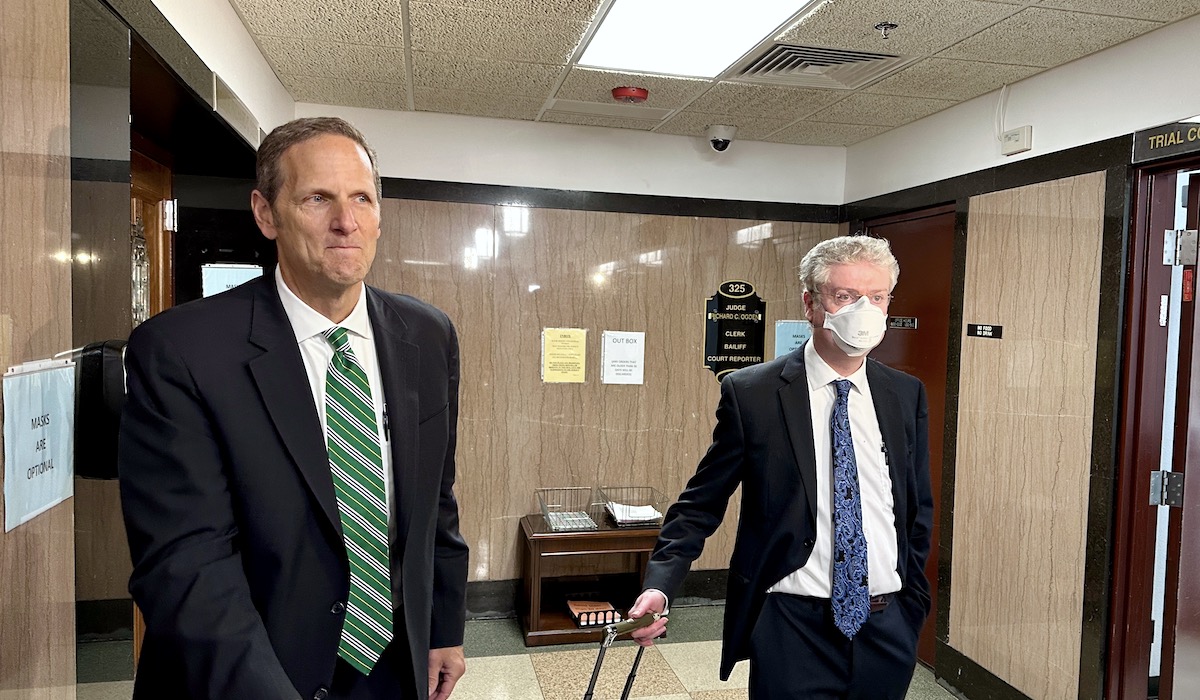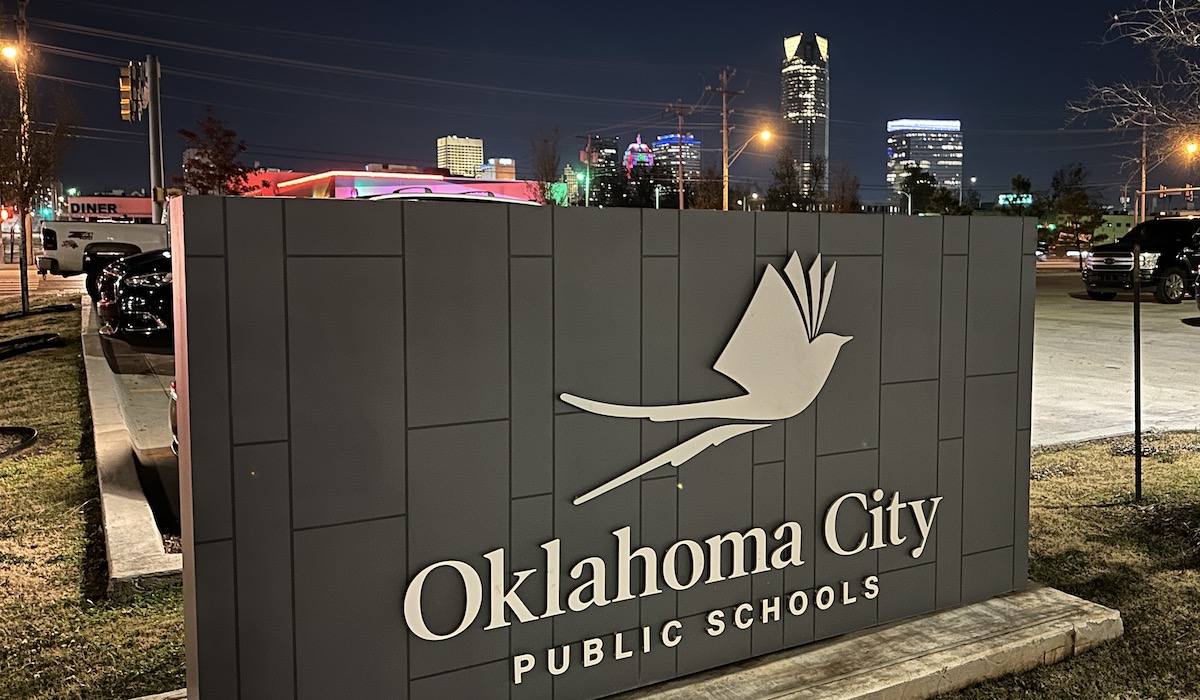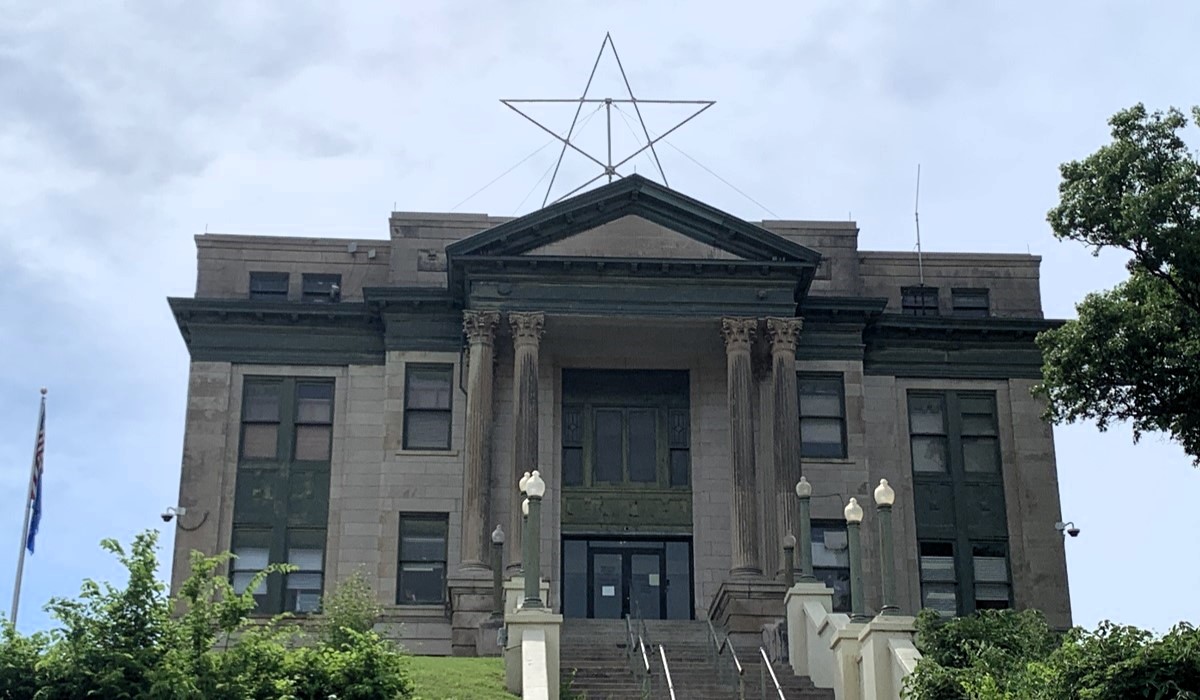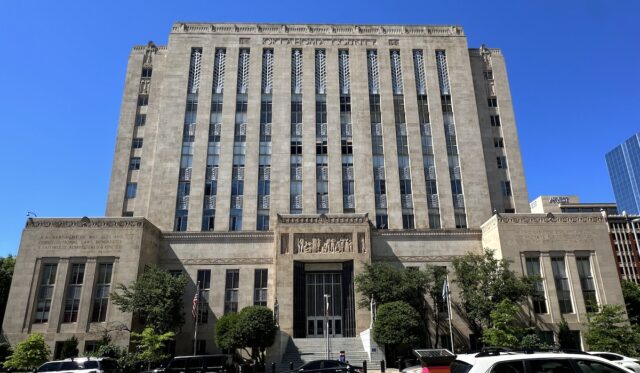As the Oklahoma Legislature adjourned sine die at the end of May, lawmakers passed a slew of last-minute bills and approved a slate of executive nominations.
With all the activity happening at the Capitol, you might have missed other important news in recent weeks, including numerous legal developments concerning existing cases and new litigation.
The following roundup offers updates and introductions to important legal cases from the last few weeks. Readers should be aware that one of the cases described below discusses allegations of rape.
St. Isidore case allowed to continue in Oklahoma County

On Wednesday, Oklahoma County District Court Judge Richard Ogden allowed a case against St. Isidore of Seville Catholic Virtual School to continue after he dismissed one of the plaintiffs’ claims against it but sustained three others.
Ogden’s decision came after a three-hour hearing wherein lawyers for the defendants — St. Isidore, the Statewide Virtual Charter School Board, State Board of Education and State Department of Education — argued the case should be thrown out because the plaintiffs — a group of 10 taxpayers — lacked standing and had failed to state plausible claims.
The plaintiffs, who include Senate District 47 candidate Erin Brewer, brought the case in July 2023 as an attempt to block St. Isidore from opening. If the school does open this August as planned, it would be the nation’s first religious charter school. Charter schools are public schools that can be privately run, but opponents say affiliating a charter school with a church violates the U.S. and Oklahoma constitutions.
“[Plaintiffs] don’t have a connection to St. Isidore,” Phil Sechler, who represents the SVCSB, said during Wednesday’s hearing. “They don’t work there. They don’t go to school there. (…) They allege only that they pay taxes.”
But Ogden only agreed the plaintiffs lack standing for their first claim that the school had failed to agree not to discriminate against students and employees based on religion. The plaintiffs’ three other claims — that St. Isidore’s policies will result in discrimination, that the school will not adequately educate children with disabilities, and that it violates prohibitions against public schools teaching religious curriculum — will remain issues in the case.
“We’re pretty happy with how it went today,” said Alex Luchenitser, one of the plaintiffs’ lawyers. “Public funds should not go to support religious schools. St. Isidore wants to create essentially a religious public school that’s never existed in the history of the United States. It would be un-American. It would fundamentally change and harm our public education system.”
Sechler argued after the hearing that a separate but related case pending before the Oklahoma Supreme Court and brought by Attorney General Gentner Drummond could render this case irrelevant.
“The Oklahoma Supreme Court’s decision will have a big impact on claims two, three and four,” Sechler said. “We think the Supreme Court knows the timing of the opening of St. Isidore, and so that’s why we expect the court is going to rule fairly imminently on the pending matter.”
Barring a Supreme Court decision, the lawyers are all expected back in court in a matter of weeks for a hearing on the 10 plaintiffs’ motion for a temporary injunction blocking the school from opening. Ogden set aside three days in late July to conduct an evidentiary hearing.
DOJ sues Oklahoma City Public Schools

On May 29, the U.S. Department of Justice announced it had filed a lawsuit against Oklahoma City Public Schools on behalf of Michael McCullough, a former band teacher in the district and member of the U.S. Air Force reserves who says he was not reemployed after he was called to active duty in 2022. while teaching in the district.
Lawyers for the DOJ said in their complaint against OKCPS that McCullough was encouraged to resign after he told the district he would have to leave for the remainder of the spring 2022 semester to fulfill his duties. While his contract status for the 2022-2023 school year had already been uncertain, McCullough alleges that he was not renewed for the next school year and was not hired for open positions in the district.
The district’s actions could be a violation of a U.S. law that requires employers to reemploy reserve service members upon completion of their active duty orders.
“Service members are called to leave their home and work to serve and protect us,” U.S. Attorney Robert J. Troester for the Western District of Oklahoma said in a press release. “It is our job to make sure their employment rights are protected once they return home. My office will continue to vigorously defend the rights justly earned by those who serve our country.”
According to the complaint, this is the second time McCullough has had to deal with employment issues with OKCPS. In 2022, McCullough and the district settled a similar dispute dealing with a 2021 matter after he made a complaint to the Veterans’ Employment and Training Service. His second complaint with VETS resulted in the new litigation.
In a statement, district spokeswoman Crystal Raymond said the complaint is under review.
“OKCPS has been made aware of the lawsuit from the U.S. Department of Justice and our legal team is reviewing it,” Raymond said. “The district will work through the legal process accordingly. We cannot provide any further comment at this time.”
DOJ, ACLU allege HB 4156 violates principles of federalism

The U.S. Department of Justice and the American Civil Liberties Union filed separate lawsuits in May challenging a controversial state immigration law that criminalizes entering and remaining in Oklahoma without “legal authorization.” HB 4156 passed through the Oklahoma legislature in April, was signed by Gov. Kevin Stitt and is set to take effect July 1.
The pair of lawsuits filed in the U.S. District Court for the Western District of Oklahoma both requested the court to prevent the implementation of the new law. The enforcement of a similar bill passed in Texas was blocked by the federal 5th Circuit Court of Appeals. Any appeal of cases related to the Oklahoma bill would be heard by the 10th Circuit Court of Appeals.
The Department of Justice’s suit argued that HB 4156 is unconstitutional because it violates principles of federalism.
“If HB 4156 takes effect, it would interfere with the exclusive authority of the federal government to control noncitizens’ entry and reentry into, and presence in, the United States to conduct foreign relations,” Department of Justice attorneys wrote.
The DOJ brief focuses on two ways the bill upsets federalism. First, the brief argues that federal law preempts state immigration laws. The federal preemption doctrine prevents states from passing laws related to topics with comprehensive federal regulations.
Second, the brief focuses in on the commerce clause and argues HB 4156 would infringe on federal authority to regulate foreign commerce, “which has long been understood to encompass the regulation of both persons and commodities.”
In their case, ACLU filed a petition that makes virtually the same arguments as the federal petition, while adding an argument that the bill’s removal provisions violate the constitutional prohibition on cruel and unusual punishment.
“HB 4156 violates the Eighth Amendment because it requires noncitizens convicted of state illegal entry or state illegal reentry to leave the state within 72 hours of their conviction or release from custody,” ACLU attorneys wrote. “This effectively results in their banishment from the state and constitutes cruel and unusual punishment.”
The United States Supreme Court does not appear to have directly addressed the question of whether banishment or exile qualifies as cruel and unusual punishment, although a few lower courts have reviewed the concept with mixed results. The banishment of North Dakota Gov. Kristi Noem from Indian reservations within state boundaries has become probably the most famous contemporary example of banishment, but probation conditions requiring one to leave a state or county and regulations on where sex offenders may stand as more common types of banishment statutes.
The federal brief also referenced HB 4156’s removal provision, but in the context of its potential effect on foreign relations.
“By permitting state officials to effectively exile noncitizens from the state, HB 4156 risks international controversy and possible retaliations against United States citizens in foreign countries,” cautioned the DOJ brief.
Attorney General Gentner Drummond defended HB 4156 in a May press release, arguing that federal preemption would not prevent Oklahoma from enforcing the new immigration law.
“Oklahoma is exercising its concurrent and complementary power as a sovereign state to address an ongoing public crisis within its borders through appropriate legislation,” Drummond said. “This law is a powerful tool to combat those foreign nationals who enter and remain in this country illegally, and who become involved in serious criminal activity such as illegal marijuana-grow operations, fentanyl distribution, sex trafficking, and labor trafficking.”
On Wednesday, Oklahoma director of special litigation Zach West filed a motion to combine the two lawsuits, saying the Attorney General’s Office had met with both petitioning parties and that neither party opposed consolidating the cases since they share similar legal claims.
Judge: Cabinet secretaries fall under dual office-holding statute
A district court judge has ruled mostly in favor of an opinion by Attorney General Gentner Drummond that a governor’s Cabinet secretaries are subject to Oklahoma statute prohibiting dual office-holding.
Oklahoma County District Court Judge Richard Ogden issued an opinion May 31 saying that, since 2021 when Senate Bill 913 was passed and signed into law, Cabinet secretaries “categorically are officeholders or officers of the state of Oklahoma” and subject to the prohibition against dual office holding. However, Ogden disagreed with Drummond’s view that an officeholder who takes a second office effectively has vacated that first office. Ogden ruled that any dual officeholder in a governor’s Cabinet can be forcibly removed only through a quo warranto proceeding, which can be initiated by the attorney general or a district attorney.
Drummond issued his opinion in February after being asked by State Sen. Mary Boren (D-Norman) whether Tim Gatz, who at the time was serving as executive director of both the Oklahoma Department of Transportation and the Oklahoma Turnpike Authority as well as transportation secretary on Gov. Kevin Stitt’s Cabinet, could hold all three positions. Gatz subsequently resigned.
Stitt, who sought a court ruling on Drummond’s opinion, could appeal Ogden’s decision, request a rehearing or seek a change in state law. Legislators this past session approved SB 1196 to protect the dual roles of Blayne Arthur, who serves as both secretary of agriculture and as commissioner of the Department of Agriculture, Food and Forestry. Stitt vetoed the measure, saying it was unnecessary because the law was clear that he could select a Cabinet secretary from agency directors.
It has been common practice for a governor’s Cabinet members to serve concurrently as heads of state agencies. But Ogden said that changed in 2015 when Gov. Mary Fallin issued an executive order giving Cabinet secretaries veto power over proposed administrative rules “and certainly since 2021” when SB 913 was approved. When legislators approved that law without making exceptions for Cabinet secretaries, it signaled their intent not to exclude them “from the general rule against dual office holding,” Ogden wrote.
Stitt is weighing his options, according to a statement from his office.
“Although the governor is pleased the court held that AG opinions cannot be used to remove agency directors or Cabinet secretaries, we are disappointed that the court otherwise felt confined to the AG’s analysis, disrupting decades of precedent,” said Abegail Cave, Stitt’s director of communications.
Drummond’s office issued a statement saying the attorney general was pleased the court affirmed his official opinion.
“He is committed to working with the governor and Cabinet secretaries to ensure the smooth operation of state government in compliance with the ruling,” press secretary Leslie Berger said.
SCOTUS sides with tribes on health care costs in 5-4 decision
In a 5-4 decision, the United States Supreme Court ruled federal law requires the federal government to reimburse tribal governments who operate their own health care facilities under the Indian Health Service’s “self determination contracts” for some additional costs they incur running their own expanded programs.
Under existing federal law, a tribal government may take over responsibility for running its own health care services from IHS, a federal agency.
The federal government is responsible for providing funding to cover the additional costs tribes incur running their own facilities, such as auditing, hiring a legal department and hiring a human resources department. IHS facilities do not have these additional costs because they use other federal agencies for personnel department, auditing and legal representation.
When tribes operate their own health systems — such as the Cherokee Nation and Chickasaw Nation in Oklahoma — federal law allows tribes to collect money from public and private insurance systems and spend that money on health care related expenses. The question before the Supreme Court was whether the federal government was required to pay for the additional costs related to providing that care.
In the court’s majority opinion, Chief Justice John Roberts found that the federal government must reimburse the additional cost incurred by self-operational tribal health care systems that provide additional care based on money collected from insurance systems. Justice Brett Kavanaugh wrote the dissent, arguing the court was upsetting a prior interpretation used for 30 years. Kavanaugh said the court’s ruling would cost the federal government an additional $800 million to $2 billion annually.
Cherokee Nation Principal Chief Chuck Hoskin Jr. called the SCOTUS decision a “victory for all of Indian Country.”
“Since Cherokee Nation assumed self-governance over our health care system, we have dramatically improved the quality of care and services available to tribal citizens,” Hoskin said in a statement. “Yet when we reinvest revenues into expanded care, we have not received the same support as other federal health care programs. With this ruling, self-governances tribes will finally receive that equitable support.”
Citing Corporation Commission, company blames high natural prices on extreme weather

In a motion to dismiss filed in Osage County District Court on June 3 alongside more than 400 pages of exhibits, attorneys representing ET Gathering and Processing LLC argued that prior decisions by the Oklahoma Corporation Commission and other courts should prevent new litigation about the cause of high natural gas prices during Winter Storm Uri in 2021.
The company, a subsidiary of Energy Transfer, argued that Attorney General Gentner Drummond’s office failed to make adequate arguments for its claims filed in April on behalf of the Grand River Dam Authority that natural gas marketing companies engaged in price manipulation, contract violation and civil conspiracy to make large profits during the historic storm. The company’s motion also requested that the lawsuit be transferred to Oklahoma County if it is allowed to continue.
The argument to transfer the case if it continues is based on a clause in the contract between ET Gathering and the Grand River Dam Authority requiring suits between the parties to be filed in Oklahoma County. Since Osage County District Court is not part of the state’s e-filing pilot program, court filings for the current suit have been physically delivered to the county courthouse in Pawhuska.
The motion also argues that the Oklahoma Corporation Commission already determined the cause of the high natural gas prices was the extreme weather and that the attorney general’s office failed to raise arguments during the earlier proceedings. The Corporation Commission has issued several decisions and reports related to Winter Storm Uri costswith largely the same initial findings, all in 2-1 decisions with Commissioner Bob Anthony dissenting.
“The stench of these rotten deals is so pervasive, people on the outside are beginning to pinch their nose and look toward the Jim Thorpe building with wrinkled brows wondering what the hell is going on at the Oklahoma Corporation Commission,” Anthony wrote in an April 2023 dissent. “Not only are these public injustices rotting from a putrid core of greed, public corruption and regulatory capture, but so are the various layers of whitewash that have been repeatedly and sloppily applied by their proponents and apologists over the last two years.”
While Anthony’s dissents are fiery and eye-catching, the commission’s official findings generally support ET Gatherings’ argument that winter weather caused the spike in natural gas prices. Anthony, the longest serving corporation commissioner in state history, is term limited this year after serving six six-year terms. He has served one more term than the prior record holder, Ray C. Jones.
Lawsuit alleges ‘rape culture’ at Tulsa County Family Center for Juvenile Justice

A civil lawsuit filed against Tulsa County and a slate of other defendants alleges the county’s juvenile detention center failed to prevent employees from sexually abusing multiple former inmates. The allegations include detention officers trading vapes, marijuana gummies and other gifts or unauthorized privileges to inmates — all of whom were under 18 at the time of their confinement — in exchange for sexual favors.
The lawsuit follows Tulsa County District Attorney Steve Kunzweiler filing criminal charges against former detention officer Jonathan Hines, also a named defendant in the civil suit, on April 26 and June 5. Hines faces charges for child trafficking, possessing a cell phone in a jail, destroying evidence and soliciting indecent photos from a minor.
Filed in U.S. District Court for the Eastern District of Oklahoma against Tulsa County’s Board of Commissioners, its District Court Juvenile Bureau, leaders of the Oklahoma Office of Juvenile Affairs and more than a dozen employees, the lawsuit accuses Hines of sexually assaulting at least four different inmates and a family member. State law and federal law both define sex between a government employee and a person in their custody as rape.
While Hines is the only former employee of the Tulsa County Juvenile Detention Center currently facing criminal charges, the civil lawsuit makes similar allegations against other named and unnamed detention officers. The suit also alleges that agency leadership failed to address the known “rape culture” problem at the facility.
“The juvenile detention center promotes rape culture within its walls and each and every one of the defendants is culpable, in some fashion, for committing said act, promoting said culture or for turning a blind eye, despite overwhelming information, evidence, and documented proof that said depravities were occurring to children,” the suit argues. “Defendants have been aware of these facts and circumstances since mid-2023, likely before, and have chosen to do nothing to intervene in the pervasive culture within the juvenile detention center.”
Filed May 23 by attorneys Donald Smolen II, Michael Smith and Chris Brecht on behalf of 20 “Child Doe” defendants and one “Jane Doe” defendant, the suit makes additional allegations against detention officers other than Hines, including:
- That former detention officer Austin Zenzen grabbed an underage inmate’s genitals while he used the bathroom;
- That former employee Mandi Lee Raymond traded sex for vape pens with at least one underage inmate;
- That former detention officer Dquan Doyle sexually assaulted at least two underage inmates in exchange for marijuana products; and
- That former employee Cindy Treadway “was involved in a romantic relationship” with at least one underage inmate.
According to the lawsuit, the situation at the Tulsa County Family Center for Juvenile Justice eventually culminated in a detention officer allegedly threatening the attorney representing an inmate allegedly raped by Hines, telling them “you need to tell your client to keep his mouth shut” in the parking lot of the detention center April 19. The officer later denied making that comment and other comments to the attorney.
On April 24, the Tulsa County Public Defender’s Office notified various agencies of the April 19 incident. Within 20 minutes of the public defender’s email, District Judge Kevin Gray — who oversees the Tulsa County Juvenile Justice Center as the head of Tulsa County District Court’s Juvenile Division — sent an email to Anthony Taylor, the former facility’s director.
Gray wrote:
I’m sure you read the email from Ms. Feldhake that she sent a short while ago. They brought the detention officer’s conversation to my attention yesterday, and it is quite disturbing. I do agree that it worries me that this exemplifies a culture that might not understand the magnitude of the responsibility that detention officers carry with them as they care for some of our most vulnerable young citizens. I would ask that there be a mandatory meeting and training done as soon as possible to discuss issues surrounding inappropriate contact with detainees, specifically sexual contact. I know that you know this, but it appears that some of the staff either does not know or simply disagrees with the reality that it is a crime to engage in ANY sexual contact with a detainee, even if that contact is initiated by or done willingly by a detainee. Not only is it a crime, but a conviction of such a crime will place an offender on the Sex Offenders Registry. Additionally, I would like for a part of that training to make clear to the detention officers that it is absolutely inappropriate for them to encourage the detainees not to talk about incidents, not to report incidents, or to otherwise share information they have about incidents. It is astonishing to me that someone would make such comments to our detainees. The detainees should ABSOLUTELY be reporting such contact to supervisors and/or their attorneys, and detention leadership should address the issues appropriately. The staff also needs to be informed (because clearly this particular detention officer does not know) that federal and state law would not allow our detainees to be simply transferred to DLM if our detention facility were to either close or lose its license. If they don’t know, they need to be educated about the law. It appears to me that any mention of DLM to the detainees would be designed to frighten or otherwise intimidate the detainees into silence. That is also unacceptable and inappropriate.
Additionally, I would like to review our detention center’s policies regarding the reporting of critical incidents such as the one that occurred the other day, to take into account the related but particular needs of both a personnel investigation and a criminal investigation. I understand the need to make sure that detention ascertains quickly what, if any, incident occurred so as to take proactive action regarding suspending or otherwise reassigning personnel until a thorough investigation is
completed. That said, we must ensure that a personnel investigation neither hampers nor harms any subsequent criminal investigation. We also need to ensure that all detention leadership is clear on who needs to be informed about such an incident, when they need to be informed, and what law enforcement agency should take the lead on any criminal investigation. It is my position that as soon as any safety or security issues are quickly resolved, that law enforcement needs to be IMMEDIATELY called to initiate a criminal investigation. The delay in engaging law enforcement should not be measured in days, but likely in minutes or an hour. Coupled with that should be immediate notification to a detainee’s parents and attorney, not as an afterthought but as a quick response to the incident. I would like to ensure that our policies and procedures reflect these positions. If not, they need to be updated and/or changed.






















